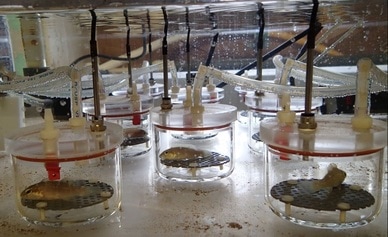Research Overview
The overarching goal of my research program is to understand the mechanisms and functional, ecological, and adaptive significance of physiological diversity among animals. Our work considers the physiological variation that exists within individuals (i.e. acute reactions, phenotypic plasticity) as well as across populations, species, and broad phylogenetic boundaries (i.e. evolutionary). Studying physiological diversity and its underlying mechanisms across these scales, in particular, provides insight into the vulnerability or tolerance of animals to environmental change, which can challenge organismal persistence by constraining function and performance. Much of our research, therefore, is directed at understanding the physiological responses that allow animals to maintain function and performance and thus persist in challenging environments, including exposure to abiotic, biotic, and anthropogenic stressors.
Working mostly on fishes because of their biological and economic importance, we focus on two major, integrated physiological systems: energy metabolism, or how energy is supplied and used, and the cardiorespiratory system that sustains it. These are ideal systems in which to broadly explore the significance of physiological diversity because metabolism is fundamental to all life processes, and metabolic function is sensitive to many forms of environmental stress. Research in the Speers-Roesch lab involves comparative and experimental approaches incorporating biochemical, molecular, cellular, organ system, and organismal techniques. Ultimately, we aim to integrate physiology from cell to environment, to use physiology to assess and forecast the consequences for animals of anthropogenic impacts on the environment, and to understand the physiological linkages between environmental variability, organismal function and performance, and ecological and evolutionary patterns.
Working mostly on fishes because of their biological and economic importance, we focus on two major, integrated physiological systems: energy metabolism, or how energy is supplied and used, and the cardiorespiratory system that sustains it. These are ideal systems in which to broadly explore the significance of physiological diversity because metabolism is fundamental to all life processes, and metabolic function is sensitive to many forms of environmental stress. Research in the Speers-Roesch lab involves comparative and experimental approaches incorporating biochemical, molecular, cellular, organ system, and organismal techniques. Ultimately, we aim to integrate physiology from cell to environment, to use physiology to assess and forecast the consequences for animals of anthropogenic impacts on the environment, and to understand the physiological linkages between environmental variability, organismal function and performance, and ecological and evolutionary patterns.
Currently, we are carrying out projects to investigate:
- The physiological and behavioural mechanisms underlying winter dormancy in fishes
- Causes & consequences of overwintering strategies in fishes
- Physiological and biochemical constraints on the deep-sea distribution of sharks and their relatives
- Physiological and behavioural responses to 'ocean acidification' in temperate and tropical fishes
- The physiological bases of variation in hypoxia tolerance among fishes
- The impacts of dietary preference and fasting on metabolic pathways in fishes and cephalopods
- The interactive effects of biotic stress (competition with invasive species) and abiotic stress (UV radiation, temperature) on physiological performance in amphibians and fishes
- The diversity and patterns of energy metabolism among vertebrates, including elasmobranchs
Research Equipment & Facilities

Our research is carried out in wet and dry lab space at the University of New Brunswick, Saint John. The temperature-controlled wet labs have freshwater and seawater on tap as well as recirculating systems for housing and conducting experiments on a wide range of aquatic animals. A diverse array of equipment is available to measure the impacts of environmental change on physiological and behavioural traits of fishes and other animals, including cutting-edge automated fibre-optic oxygen measurement systems for metabolic rate measurements, infrared video cameras and automated software to track animal movement, multiple swim tunnels (2 - 90 L) to examine locomotory performance, microplate and cuvette spectrophotometers for biochemical analyses, behavioural arenas to measure environmental preferences, a calorimeter to measure tissue energy content, cardiovascular flow equipment, ion analysis tools, and cooling/heating systems to examine effects of thermal variability. Within the department, there are state-of-the-art genomics and ecotoxicology facilities. The nearby Huntsman Marine Sciences Centre provides a large-scale marine lab that further expands the scope for research on marine animals, including large fishes such as skates.
Funding
Our research is generously supported by the Natural Sciences and Engineering Research Council of Canada, the New Brunswick Innovation Foundation, the Canada Foundation for Innovation, and the University of New Brunswick.
Collaborators
|
CANADA
Dr. Bill Driedzic (Memorial University of Newfoundland) Dr. Tony Farrell (University of British Columbia) Dr. Simon Lamarre (Université de Moncton) Dr. Tyson MacCormack (Mount Allison University) Dr. Milica Mandic (University of Ottawa) Dr. Graham Raby (Trent University) Dr. Jeff Richards (University of British Columbia) Dr. Graham Scott (McMaster University) Dr. Jason Treberg (University of Manitoba) Dr. Sandra Binning (Universite de Montreal) Dr. Dominique Roche (Carleton University) USA Dr. Jason Bystriansky (DePaul University) Dr. Rashpal Dhillon (University of Wisconsin, Madison) Dr. David Toews (Penn State University) Dr. Paul Yancey (Whitman College) |
AUSTRALIA
Dr. Tim Clark (Deakin University) Dr. Craig Franklin (University of Queensland) EUROPE Dr. Fredrik Jutfelt (Norwegian University of Science and Technology) Dr. Tommy Norin (Danish Technical University) Dr. Erik Sandblom (Gothenburg University) Dr. Josefin Sundin (Uppsala University) Dr. Rasmus Ern (Aalborg University) Dr. Antonio Sykes (Universidade do Algarve) BRAZIL Dr. Adalberto Val (Instituto Nacional de Pesquisas da Amazonia) Dr. Vera Val (Instituto Nacional de Pesquisas da Amazonia) |